Understanding the North-South Divide: Economic and Political Analysis
VerifiedAdded on 2023/04/07
|7
|1558
|296
Essay
AI Summary
This essay examines the North-South divide, a socioeconomic and political division between developed (North) and developing (South) countries. It traces the historical roots of this divide to European colonialism and industrialization, which created unequal international exchange relations. The essay discusses issues such as the lack of development capital, government instabilities in the South, and the North's reluctance to share wealth or alter the International Economic Order. It highlights the South's demands for resource transfer and the North's insistence on market economic reforms. The essay also touches upon the impact of neocolonialism, the Cold War, and the importance of self-confidence and human resource development for the South to achieve economic progress. It concludes that the South needs to leverage its human resources and address internal challenges like corruption to foster economic development, despite the historical and ongoing challenges posed by the North.
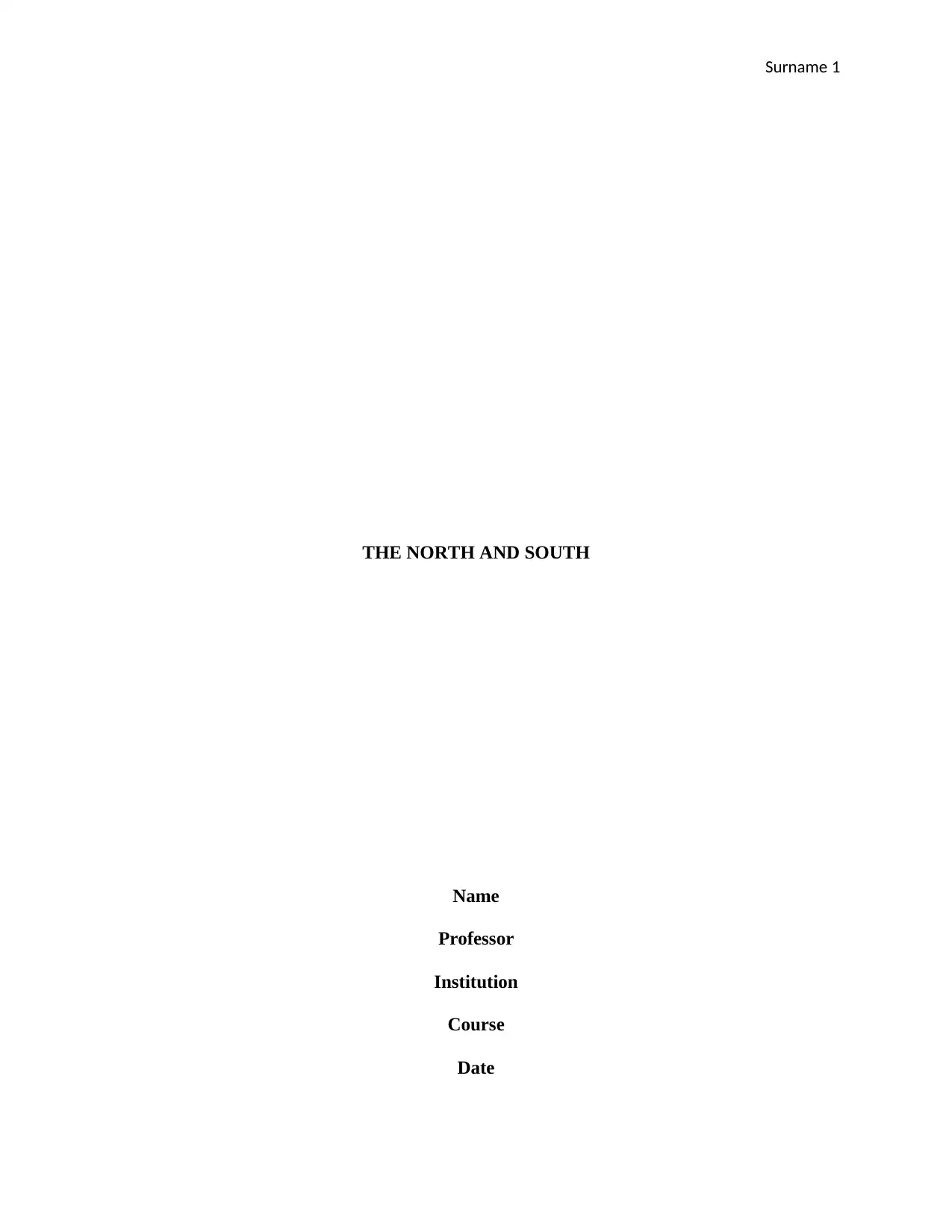
Surname 1
THE NORTH AND SOUTH
Name
Professor
Institution
Course
Date
THE NORTH AND SOUTH
Name
Professor
Institution
Course
Date
Paraphrase This Document
Need a fresh take? Get an instant paraphrase of this document with our AI Paraphraser
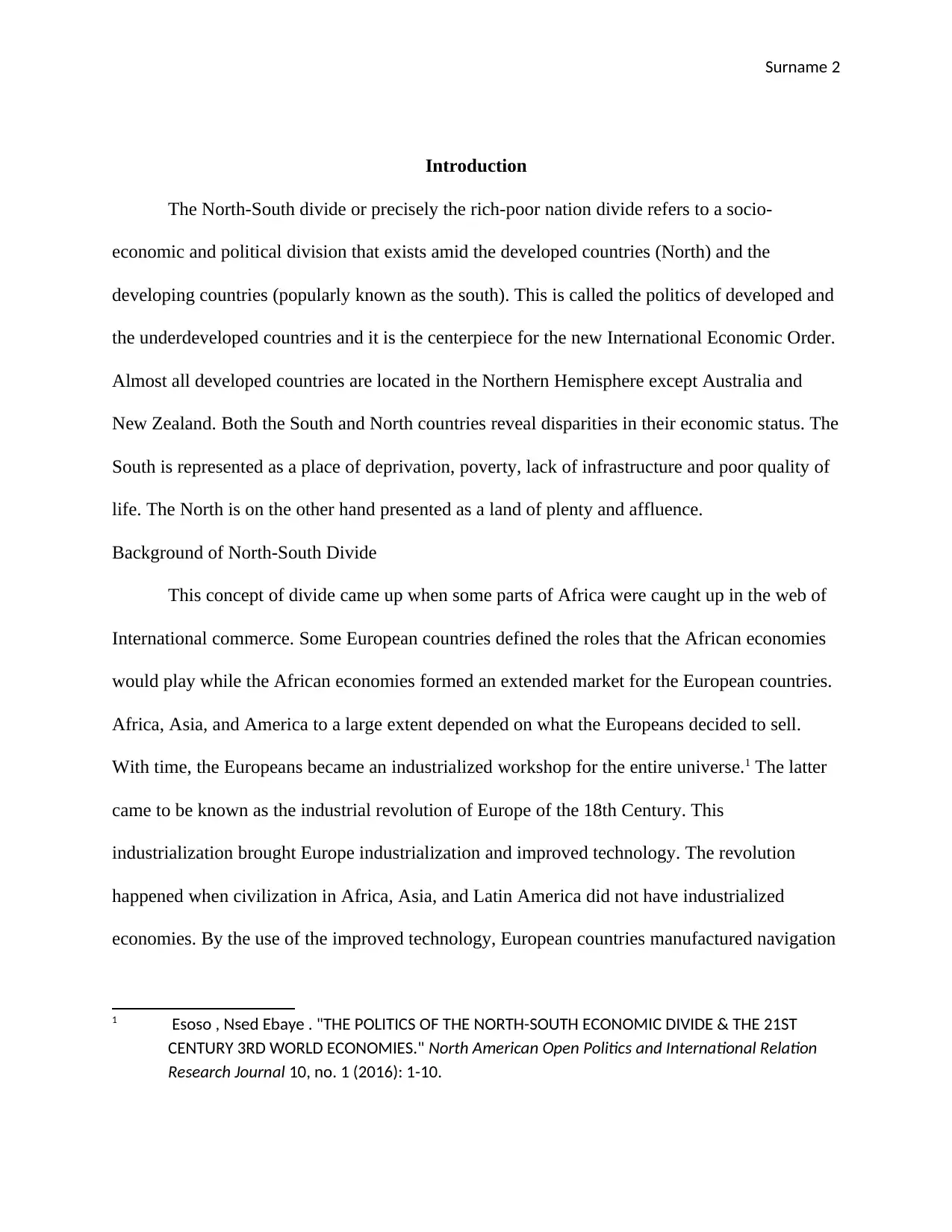
Surname 2
Introduction
The North-South divide or precisely the rich-poor nation divide refers to a socio-
economic and political division that exists amid the developed countries (North) and the
developing countries (popularly known as the south). This is called the politics of developed and
the underdeveloped countries and it is the centerpiece for the new International Economic Order.
Almost all developed countries are located in the Northern Hemisphere except Australia and
New Zealand. Both the South and North countries reveal disparities in their economic status. The
South is represented as a place of deprivation, poverty, lack of infrastructure and poor quality of
life. The North is on the other hand presented as a land of plenty and affluence.
Background of North-South Divide
This concept of divide came up when some parts of Africa were caught up in the web of
International commerce. Some European countries defined the roles that the African economies
would play while the African economies formed an extended market for the European countries.
Africa, Asia, and America to a large extent depended on what the Europeans decided to sell.
With time, the Europeans became an industrialized workshop for the entire universe.1 The latter
came to be known as the industrial revolution of Europe of the 18th Century. This
industrialization brought Europe industrialization and improved technology. The revolution
happened when civilization in Africa, Asia, and Latin America did not have industrialized
economies. By the use of the improved technology, European countries manufactured navigation
1 Esoso , Nsed Ebaye . "THE POLITICS OF THE NORTH-SOUTH ECONOMIC DIVIDE & THE 21ST
CENTURY 3RD WORLD ECONOMIES." North American Open Politics and International Relation
Research Journal 10, no. 1 (2016): 1-10.
Introduction
The North-South divide or precisely the rich-poor nation divide refers to a socio-
economic and political division that exists amid the developed countries (North) and the
developing countries (popularly known as the south). This is called the politics of developed and
the underdeveloped countries and it is the centerpiece for the new International Economic Order.
Almost all developed countries are located in the Northern Hemisphere except Australia and
New Zealand. Both the South and North countries reveal disparities in their economic status. The
South is represented as a place of deprivation, poverty, lack of infrastructure and poor quality of
life. The North is on the other hand presented as a land of plenty and affluence.
Background of North-South Divide
This concept of divide came up when some parts of Africa were caught up in the web of
International commerce. Some European countries defined the roles that the African economies
would play while the African economies formed an extended market for the European countries.
Africa, Asia, and America to a large extent depended on what the Europeans decided to sell.
With time, the Europeans became an industrialized workshop for the entire universe.1 The latter
came to be known as the industrial revolution of Europe of the 18th Century. This
industrialization brought Europe industrialization and improved technology. The revolution
happened when civilization in Africa, Asia, and Latin America did not have industrialized
economies. By the use of the improved technology, European countries manufactured navigation
1 Esoso , Nsed Ebaye . "THE POLITICS OF THE NORTH-SOUTH ECONOMIC DIVIDE & THE 21ST
CENTURY 3RD WORLD ECONOMIES." North American Open Politics and International Relation
Research Journal 10, no. 1 (2016): 1-10.
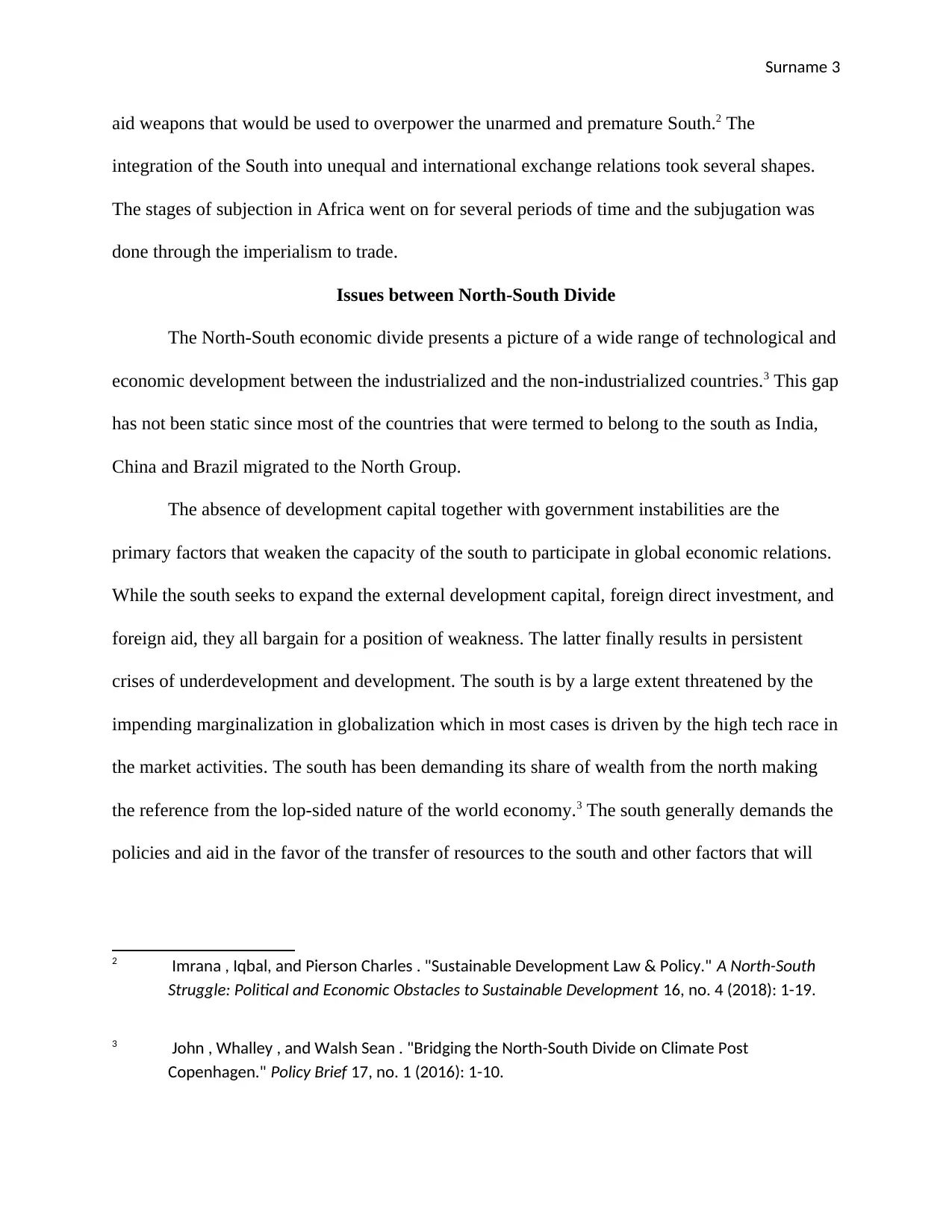
Surname 3
aid weapons that would be used to overpower the unarmed and premature South.2 The
integration of the South into unequal and international exchange relations took several shapes.
The stages of subjection in Africa went on for several periods of time and the subjugation was
done through the imperialism to trade.
Issues between North-South Divide
The North-South economic divide presents a picture of a wide range of technological and
economic development between the industrialized and the non-industrialized countries.3 This gap
has not been static since most of the countries that were termed to belong to the south as India,
China and Brazil migrated to the North Group.
The absence of development capital together with government instabilities are the
primary factors that weaken the capacity of the south to participate in global economic relations.
While the south seeks to expand the external development capital, foreign direct investment, and
foreign aid, they all bargain for a position of weakness. The latter finally results in persistent
crises of underdevelopment and development. The south is by a large extent threatened by the
impending marginalization in globalization which in most cases is driven by the high tech race in
the market activities. The south has been demanding its share of wealth from the north making
the reference from the lop-sided nature of the world economy.3 The south generally demands the
policies and aid in the favor of the transfer of resources to the south and other factors that will
2 Imrana , Iqbal, and Pierson Charles . "Sustainable Development Law & Policy." A North-South
Struggle: Political and Economic Obstacles to Sustainable Development 16, no. 4 (2018): 1-19.
3 John , Whalley , and Walsh Sean . "Bridging the North-South Divide on Climate Post
Copenhagen." Policy Brief 17, no. 1 (2016): 1-10.
aid weapons that would be used to overpower the unarmed and premature South.2 The
integration of the South into unequal and international exchange relations took several shapes.
The stages of subjection in Africa went on for several periods of time and the subjugation was
done through the imperialism to trade.
Issues between North-South Divide
The North-South economic divide presents a picture of a wide range of technological and
economic development between the industrialized and the non-industrialized countries.3 This gap
has not been static since most of the countries that were termed to belong to the south as India,
China and Brazil migrated to the North Group.
The absence of development capital together with government instabilities are the
primary factors that weaken the capacity of the south to participate in global economic relations.
While the south seeks to expand the external development capital, foreign direct investment, and
foreign aid, they all bargain for a position of weakness. The latter finally results in persistent
crises of underdevelopment and development. The south is by a large extent threatened by the
impending marginalization in globalization which in most cases is driven by the high tech race in
the market activities. The south has been demanding its share of wealth from the north making
the reference from the lop-sided nature of the world economy.3 The south generally demands the
policies and aid in the favor of the transfer of resources to the south and other factors that will
2 Imrana , Iqbal, and Pierson Charles . "Sustainable Development Law & Policy." A North-South
Struggle: Political and Economic Obstacles to Sustainable Development 16, no. 4 (2018): 1-19.
3 John , Whalley , and Walsh Sean . "Bridging the North-South Divide on Climate Post
Copenhagen." Policy Brief 17, no. 1 (2016): 1-10.
⊘ This is a preview!⊘
Do you want full access?
Subscribe today to unlock all pages.

Trusted by 1+ million students worldwide
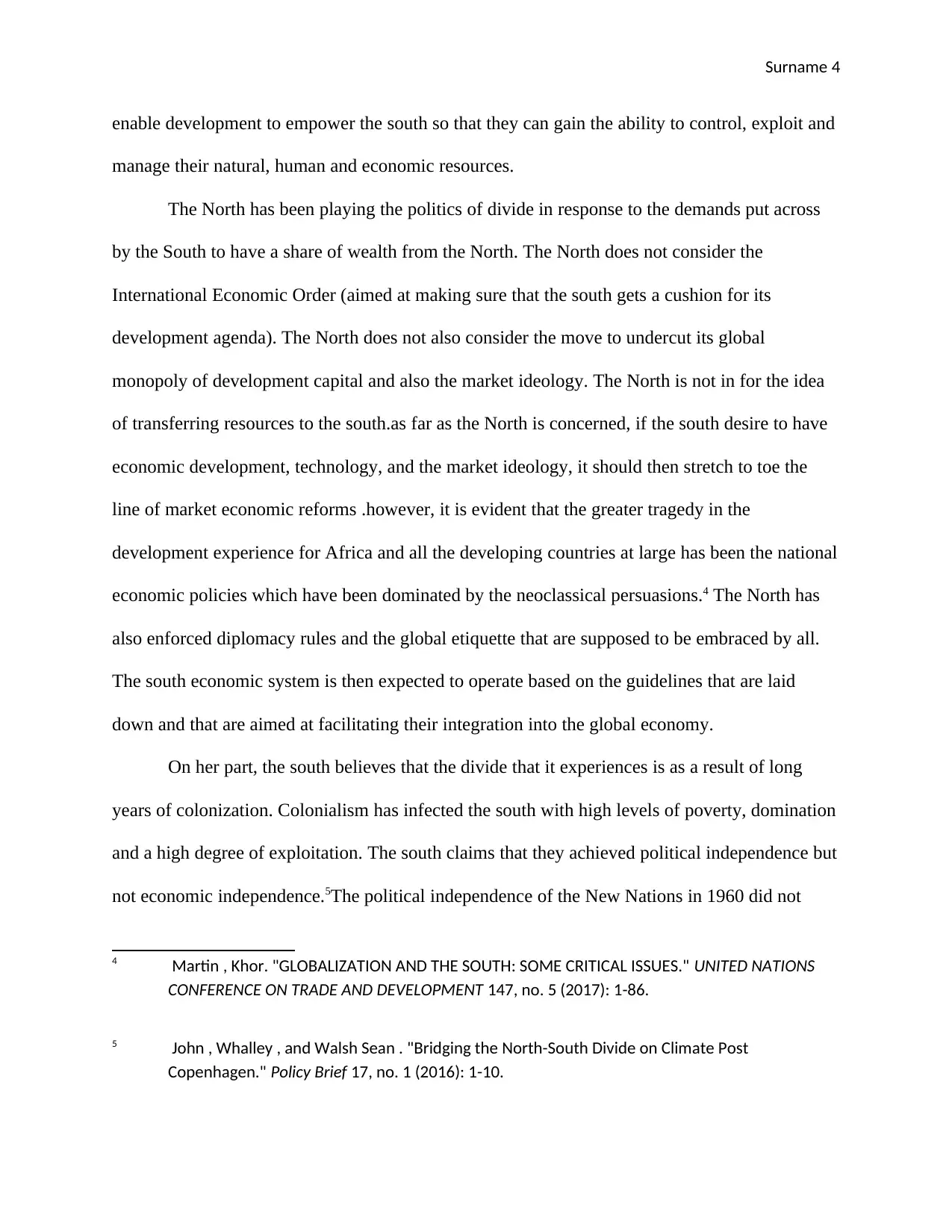
Surname 4
enable development to empower the south so that they can gain the ability to control, exploit and
manage their natural, human and economic resources.
The North has been playing the politics of divide in response to the demands put across
by the South to have a share of wealth from the North. The North does not consider the
International Economic Order (aimed at making sure that the south gets a cushion for its
development agenda). The North does not also consider the move to undercut its global
monopoly of development capital and also the market ideology. The North is not in for the idea
of transferring resources to the south.as far as the North is concerned, if the south desire to have
economic development, technology, and the market ideology, it should then stretch to toe the
line of market economic reforms .however, it is evident that the greater tragedy in the
development experience for Africa and all the developing countries at large has been the national
economic policies which have been dominated by the neoclassical persuasions.4 The North has
also enforced diplomacy rules and the global etiquette that are supposed to be embraced by all.
The south economic system is then expected to operate based on the guidelines that are laid
down and that are aimed at facilitating their integration into the global economy.
On her part, the south believes that the divide that it experiences is as a result of long
years of colonization. Colonialism has infected the south with high levels of poverty, domination
and a high degree of exploitation. The south claims that they achieved political independence but
not economic independence.5The political independence of the New Nations in 1960 did not
4 Martin , Khor. "GLOBALIZATION AND THE SOUTH: SOME CRITICAL ISSUES." UNITED NATIONS
CONFERENCE ON TRADE AND DEVELOPMENT 147, no. 5 (2017): 1-86.
5 John , Whalley , and Walsh Sean . "Bridging the North-South Divide on Climate Post
Copenhagen." Policy Brief 17, no. 1 (2016): 1-10.
enable development to empower the south so that they can gain the ability to control, exploit and
manage their natural, human and economic resources.
The North has been playing the politics of divide in response to the demands put across
by the South to have a share of wealth from the North. The North does not consider the
International Economic Order (aimed at making sure that the south gets a cushion for its
development agenda). The North does not also consider the move to undercut its global
monopoly of development capital and also the market ideology. The North is not in for the idea
of transferring resources to the south.as far as the North is concerned, if the south desire to have
economic development, technology, and the market ideology, it should then stretch to toe the
line of market economic reforms .however, it is evident that the greater tragedy in the
development experience for Africa and all the developing countries at large has been the national
economic policies which have been dominated by the neoclassical persuasions.4 The North has
also enforced diplomacy rules and the global etiquette that are supposed to be embraced by all.
The south economic system is then expected to operate based on the guidelines that are laid
down and that are aimed at facilitating their integration into the global economy.
On her part, the south believes that the divide that it experiences is as a result of long
years of colonization. Colonialism has infected the south with high levels of poverty, domination
and a high degree of exploitation. The south claims that they achieved political independence but
not economic independence.5The political independence of the New Nations in 1960 did not
4 Martin , Khor. "GLOBALIZATION AND THE SOUTH: SOME CRITICAL ISSUES." UNITED NATIONS
CONFERENCE ON TRADE AND DEVELOPMENT 147, no. 5 (2017): 1-86.
5 John , Whalley , and Walsh Sean . "Bridging the North-South Divide on Climate Post
Copenhagen." Policy Brief 17, no. 1 (2016): 1-10.
Paraphrase This Document
Need a fresh take? Get an instant paraphrase of this document with our AI Paraphraser
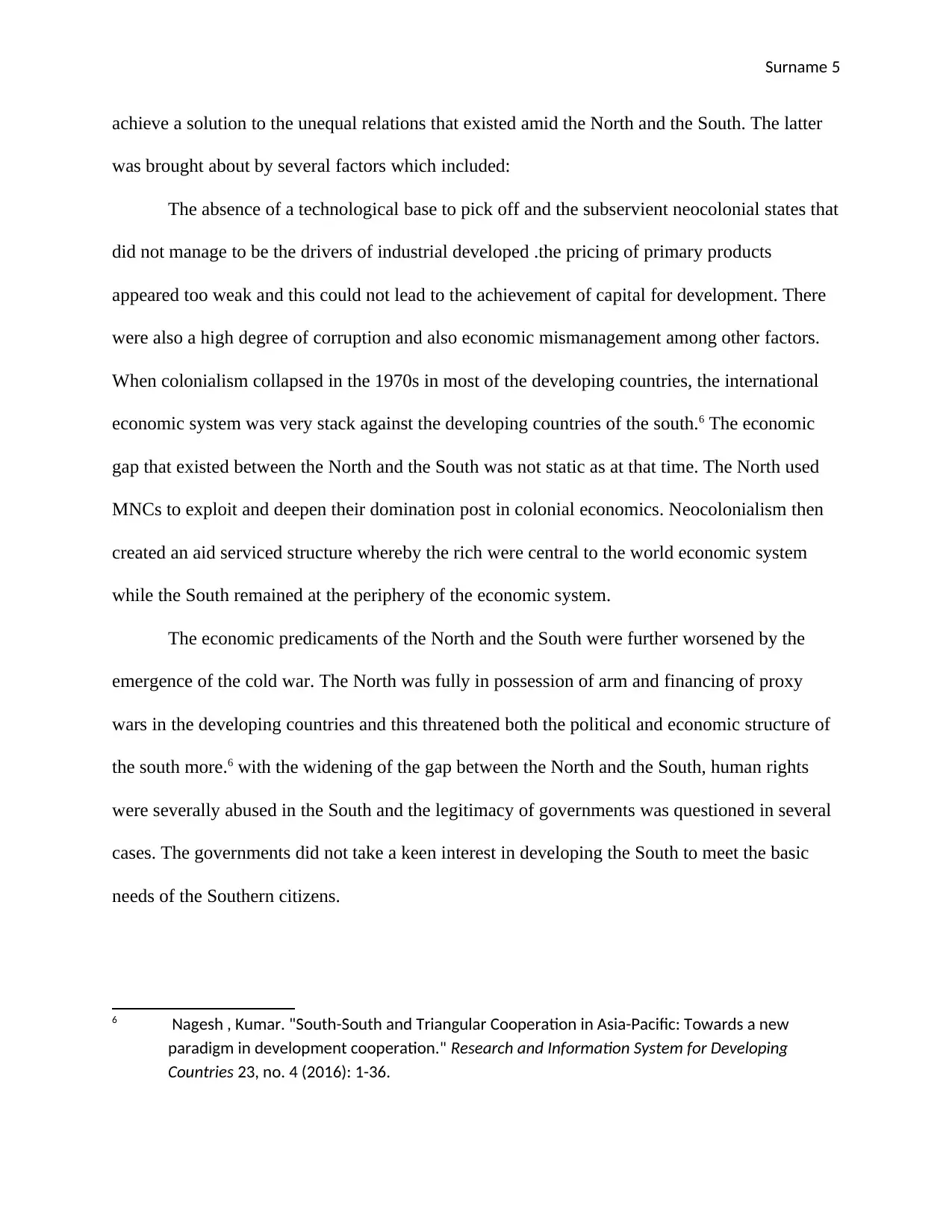
Surname 5
achieve a solution to the unequal relations that existed amid the North and the South. The latter
was brought about by several factors which included:
The absence of a technological base to pick off and the subservient neocolonial states that
did not manage to be the drivers of industrial developed .the pricing of primary products
appeared too weak and this could not lead to the achievement of capital for development. There
were also a high degree of corruption and also economic mismanagement among other factors.
When colonialism collapsed in the 1970s in most of the developing countries, the international
economic system was very stack against the developing countries of the south.6 The economic
gap that existed between the North and the South was not static as at that time. The North used
MNCs to exploit and deepen their domination post in colonial economics. Neocolonialism then
created an aid serviced structure whereby the rich were central to the world economic system
while the South remained at the periphery of the economic system.
The economic predicaments of the North and the South were further worsened by the
emergence of the cold war. The North was fully in possession of arm and financing of proxy
wars in the developing countries and this threatened both the political and economic structure of
the south more.6 with the widening of the gap between the North and the South, human rights
were severally abused in the South and the legitimacy of governments was questioned in several
cases. The governments did not take a keen interest in developing the South to meet the basic
needs of the Southern citizens.
6 Nagesh , Kumar. "South-South and Triangular Cooperation in Asia-Pacific: Towards a new
paradigm in development cooperation." Research and Information System for Developing
Countries 23, no. 4 (2016): 1-36.
achieve a solution to the unequal relations that existed amid the North and the South. The latter
was brought about by several factors which included:
The absence of a technological base to pick off and the subservient neocolonial states that
did not manage to be the drivers of industrial developed .the pricing of primary products
appeared too weak and this could not lead to the achievement of capital for development. There
were also a high degree of corruption and also economic mismanagement among other factors.
When colonialism collapsed in the 1970s in most of the developing countries, the international
economic system was very stack against the developing countries of the south.6 The economic
gap that existed between the North and the South was not static as at that time. The North used
MNCs to exploit and deepen their domination post in colonial economics. Neocolonialism then
created an aid serviced structure whereby the rich were central to the world economic system
while the South remained at the periphery of the economic system.
The economic predicaments of the North and the South were further worsened by the
emergence of the cold war. The North was fully in possession of arm and financing of proxy
wars in the developing countries and this threatened both the political and economic structure of
the south more.6 with the widening of the gap between the North and the South, human rights
were severally abused in the South and the legitimacy of governments was questioned in several
cases. The governments did not take a keen interest in developing the South to meet the basic
needs of the Southern citizens.
6 Nagesh , Kumar. "South-South and Triangular Cooperation in Asia-Pacific: Towards a new
paradigm in development cooperation." Research and Information System for Developing
Countries 23, no. 4 (2016): 1-36.
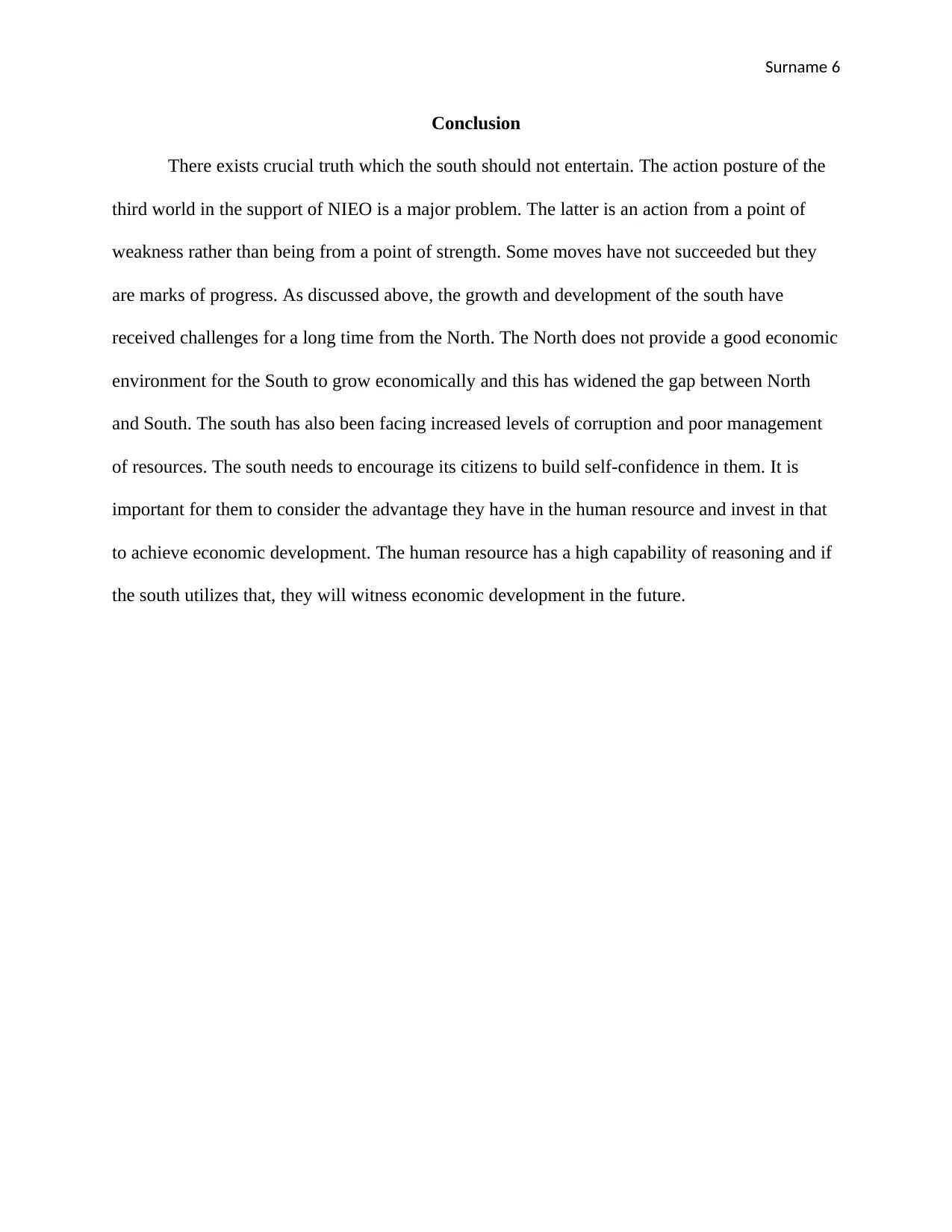
Surname 6
Conclusion
There exists crucial truth which the south should not entertain. The action posture of the
third world in the support of NIEO is a major problem. The latter is an action from a point of
weakness rather than being from a point of strength. Some moves have not succeeded but they
are marks of progress. As discussed above, the growth and development of the south have
received challenges for a long time from the North. The North does not provide a good economic
environment for the South to grow economically and this has widened the gap between North
and South. The south has also been facing increased levels of corruption and poor management
of resources. The south needs to encourage its citizens to build self-confidence in them. It is
important for them to consider the advantage they have in the human resource and invest in that
to achieve economic development. The human resource has a high capability of reasoning and if
the south utilizes that, they will witness economic development in the future.
Conclusion
There exists crucial truth which the south should not entertain. The action posture of the
third world in the support of NIEO is a major problem. The latter is an action from a point of
weakness rather than being from a point of strength. Some moves have not succeeded but they
are marks of progress. As discussed above, the growth and development of the south have
received challenges for a long time from the North. The North does not provide a good economic
environment for the South to grow economically and this has widened the gap between North
and South. The south has also been facing increased levels of corruption and poor management
of resources. The south needs to encourage its citizens to build self-confidence in them. It is
important for them to consider the advantage they have in the human resource and invest in that
to achieve economic development. The human resource has a high capability of reasoning and if
the south utilizes that, they will witness economic development in the future.
⊘ This is a preview!⊘
Do you want full access?
Subscribe today to unlock all pages.

Trusted by 1+ million students worldwide
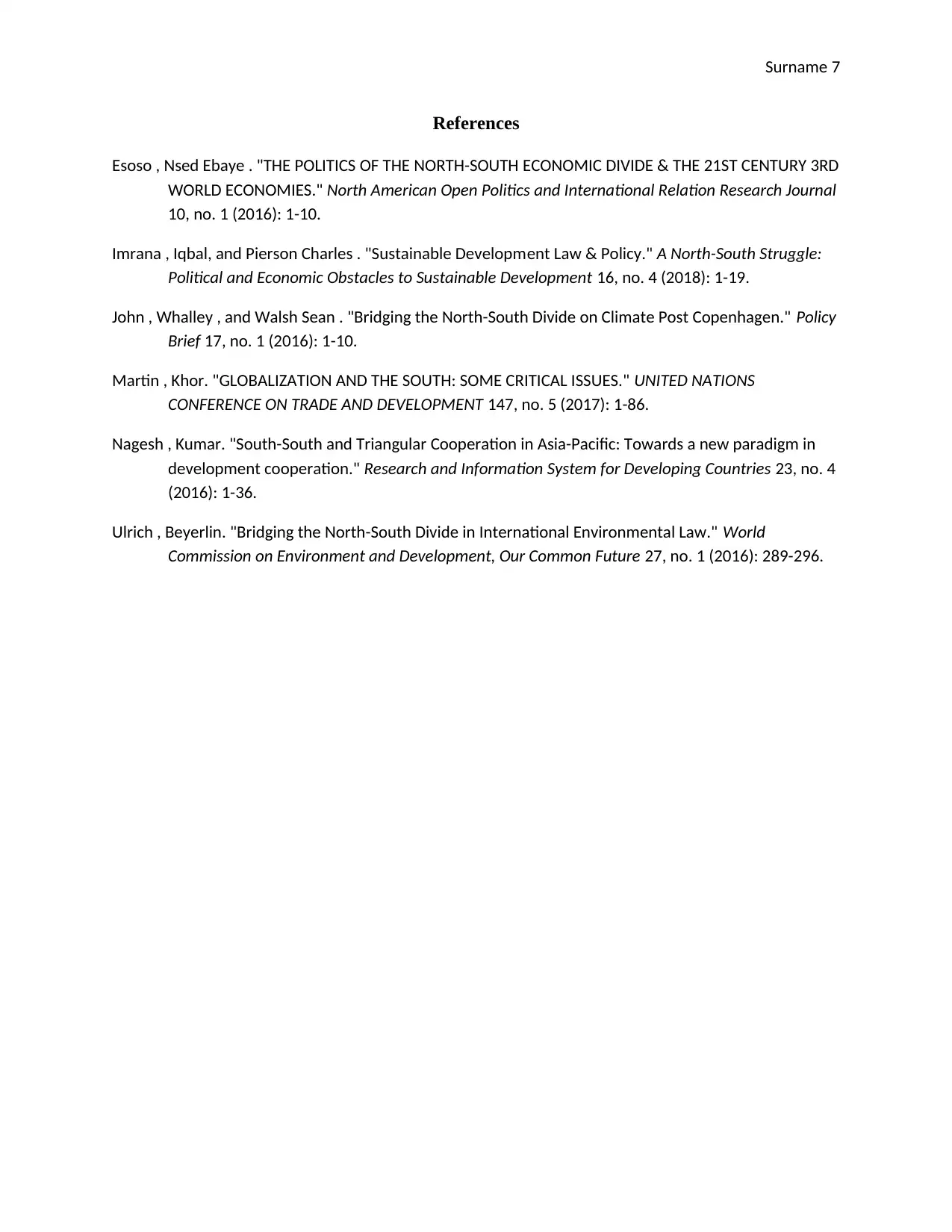
Surname 7
References
Esoso , Nsed Ebaye . "THE POLITICS OF THE NORTH-SOUTH ECONOMIC DIVIDE & THE 21ST CENTURY 3RD
WORLD ECONOMIES." North American Open Politics and International Relation Research Journal
10, no. 1 (2016): 1-10.
Imrana , Iqbal, and Pierson Charles . "Sustainable Development Law & Policy." A North-South Struggle:
Political and Economic Obstacles to Sustainable Development 16, no. 4 (2018): 1-19.
John , Whalley , and Walsh Sean . "Bridging the North-South Divide on Climate Post Copenhagen." Policy
Brief 17, no. 1 (2016): 1-10.
Martin , Khor. "GLOBALIZATION AND THE SOUTH: SOME CRITICAL ISSUES." UNITED NATIONS
CONFERENCE ON TRADE AND DEVELOPMENT 147, no. 5 (2017): 1-86.
Nagesh , Kumar. "South-South and Triangular Cooperation in Asia-Pacific: Towards a new paradigm in
development cooperation." Research and Information System for Developing Countries 23, no. 4
(2016): 1-36.
Ulrich , Beyerlin. "Bridging the North-South Divide in International Environmental Law." World
Commission on Environment and Development, Our Common Future 27, no. 1 (2016): 289-296.
References
Esoso , Nsed Ebaye . "THE POLITICS OF THE NORTH-SOUTH ECONOMIC DIVIDE & THE 21ST CENTURY 3RD
WORLD ECONOMIES." North American Open Politics and International Relation Research Journal
10, no. 1 (2016): 1-10.
Imrana , Iqbal, and Pierson Charles . "Sustainable Development Law & Policy." A North-South Struggle:
Political and Economic Obstacles to Sustainable Development 16, no. 4 (2018): 1-19.
John , Whalley , and Walsh Sean . "Bridging the North-South Divide on Climate Post Copenhagen." Policy
Brief 17, no. 1 (2016): 1-10.
Martin , Khor. "GLOBALIZATION AND THE SOUTH: SOME CRITICAL ISSUES." UNITED NATIONS
CONFERENCE ON TRADE AND DEVELOPMENT 147, no. 5 (2017): 1-86.
Nagesh , Kumar. "South-South and Triangular Cooperation in Asia-Pacific: Towards a new paradigm in
development cooperation." Research and Information System for Developing Countries 23, no. 4
(2016): 1-36.
Ulrich , Beyerlin. "Bridging the North-South Divide in International Environmental Law." World
Commission on Environment and Development, Our Common Future 27, no. 1 (2016): 289-296.
1 out of 7
Related Documents
Your All-in-One AI-Powered Toolkit for Academic Success.
+13062052269
info@desklib.com
Available 24*7 on WhatsApp / Email
![[object Object]](/_next/static/media/star-bottom.7253800d.svg)
Unlock your academic potential
Copyright © 2020–2026 A2Z Services. All Rights Reserved. Developed and managed by ZUCOL.





